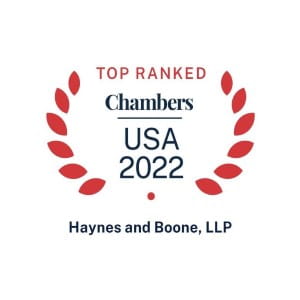ESOPs and Other Stock-Based Plans
Haynes Boone lawyers were involved in some of the first Employee Stock Ownership Plans (ESOPs) ever created and helped structure the first major leveraged ESOP transaction. Our decades-long track record designing and implementing ESOPs across many industries enables us to tailor plans to ensure they meet your company’s strategic business objectives.
What is an ESOP?
An ESOP is a qualified profit sharing plan for employees is designed to invest primarily in company stock. Shares can be acquired in various ways. One structure, for example, involves a sale by the company of 30 percent of its stock to an ESOP for cash which is borrowed from a third party lender. The company borrows the funds from the bank, giving a promissory note payable over nine years at a certain rate of interest with equal annual principal payments. The company then loans those funds to the ESOP in exchange for a virtually identical promissory note. The ESOP then uses those funds to purchase the stock from the company.
To establish a plan, a company’s board of directors appoints a trustee, who will have the authority to vote stock in the ESOP under most circumstances. The trustee can also purchase stock, pursuant to directions from the board, and sell stock.
What are the benefits of an ESOP?
- The ESOP offers an opportunity to perpetuate the company's long-term existence, without requiring the loss of current control
- An ESOP can lead to an increase in productivity of employees by giving them a stake in the company and it also rewards long-term employees
- Utilizing an ESOP to purchase stock from shareholders offers significant tax benefits which can enhance the company's credit
ESOP Implementation
We offer support from the very beginning of the ESOP implementation process:- Counseling clients about the advantages and disadvantages of various ESOP plans
- Designing the proper ESOP structure for clients and drafting all necessary plan documents and trust agreements
- Negotiating loan documents for leveraged ESOPs
- Drafting memos for companies about converting the company stock fund into an ESOP
- Creating S Corporation ESOPs
- Advising banks that lend money to companies to form ESOPs
ESOP Compliance and Ongoing Support
For entities with ESOPs currently in place, our lawyers ensure that plans are in compliance with ERISA and the Internal Revenue Code and we have broad experience with the following:- Advising clients about which ESOP plans yield the greatest tax benefit allowable under the law
- Counseling company executives, trustees and others administering plans about their fiduciary duties with ESOP transactions
- Representing clients in the event of an audit of an ESOP by the IRS, the SEC or any other government agency
- Providing guidance to clients about litigation trends affecting ESOPs
- Serving as expert witnesses in litigation affecting ESOPs
- Representing companies, trustees, lenders and shareholders in the sale of stock to ESOPs
M&A Transactions
We advise clients that may involve ESOPs in the sale or acquisition of assets by:
- Handling 1042 Exchanges
- Serving as “Special ESOP” counsel in M&A and other transactions, representing companies, ESOP trustees or financial institutions
- Providing regulatory guidance to clients faced with determining whether an investment includes the acquisition of qualifying employee securities
- Helping draft communications to participants in an ESOP to explain how a proposed M&A transaction will impact the ESOP
- Advising qualified plans about investments in ESOPs or other types of employer securities

Reminder of Annual Reporting and IRS Filings for ISO Exercises and ESPP Stock Transfers
December 13, 2022











